Widespread violence and impunity leave murders unsolved
Amid the violence and instability caused by organized crime and corruption in Central America, Honduras and Guatemala have experienced an alarming rise in the number of murders of, and attacks against, journalists. Near complete impunity for these crimes means the cases go mostly unsolved and the motives unexplained. As fear grips newsrooms in both countries, critical media outlets and journalists find they are reined in by governments increasingly intolerant of dissent. A CPJ special report by Sara Rafsky.
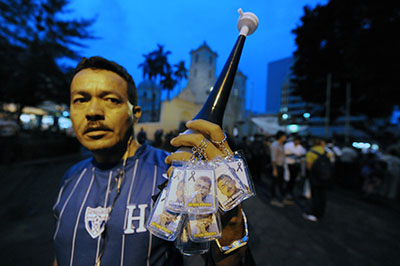
If you are wondering who ordered the 2012 murder of prominent Honduran radio host Ángel Alfredo Villatoro, ask any journalist in the country’s capital, Tegucigalpa. Everyone has a theory–which they’ll only tell you in hushed voices and off the record–and each version is wildly different. The only Hondurans who seem uninterested are the authorities. In meetings with CPJ earlier this year, they proudly presented the case as solved, citing the then recent convictions of the alleged hit men, despite no motive being clearly established or masterminds identified.
In neighboring Guatemala, police announced the capture in June of a man who they said killed journalist Jaime Napoleón Jarquin Duarte and radio station owner and politician Luis Alberto Lemus Ruano in separate attacks in 2013. Similarly, no motive or possible connection between the victims was mentioned.
More in this report
• CPJ’s recommendations
In other languages
• Español
In print
• Download the pdf
Honduras and Guatemala have witnessed an alarming uptick in murders of, and attacks against, journalists in recent years. Both countries–two of the deadliest, according to U.N. statistics–are plagued by impunity and in neither case is it clear who or what is behind the violence. This uncertainty has exacerbated the tense environments in Central America, which is experiencing widespread violence and a breakdown of the already limited rule of law due to a rise in organized crime. Lingering divisions and institutional weakness from political violence and conflict in the 1970s and 1980s, coupled with the influx of gang members deported from the U.S. and Mexican drug cartels, is affecting the entire region. But these problems have not manifested into attacks against the press as severely in other violent countries such as El Salvador–where, CPJ research shows, the most recent murder of a journalist in relation to his work was in 2011–as they have in Honduras and Guatemala.
In the outer provinces of Honduras and Guatemala, where the rule of law is particularly weak and organized crime groups have amassed control, journalists see threats everywhere and are afraid to report on sensitive issues. In the capitals Tegucigalpa and Guatemala City, much of the press corps worries that the space for critical reporting is shrinking under governments they view as intolerant to dissent. In both places, lingering political polarization from earlier social conflicts and long-standing rivalries have left the press divided and reluctant to unite against common threats. As a result, the Honduran and Guatemalan public are being deprived of information at a moment of intense challenges for their countries.
Conditions in Honduras are more dire and the country presents its neighbor with a cautionary tale. The 2009 coup that ousted President Manuel Zelaya resulted in a societal breakdown that spawned a wave of politically motivated murders and anti-press violence. The polarization extended to the press, which split into opposing camps of outlets that had supported or opposed the coup, leaving some journalists more vulnerable to attack.
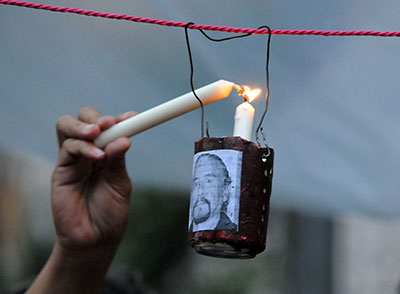
In the years since, as violence and crime have become more pervasive, the danger has only intensified. Since the coup, CPJ has identified three cases in which it is reasonably certain that a Honduran journalist was murdered in direct reprisal for his or her work. CPJ independently researches all cases of murdered journalists and defines as “confirmed” only those in which it has identified a deliberate attack against a specific journalist in relation to the victim’s work. The organization has documented 14 other murders in the same period where a work-related motive is possible but unclear. The organization classified those as “unconfirmed” and continues to investigate.
As a 2010 CPJ special report showed, slow and negligent investigations have made it difficult to determine motives in most killings. Other press freedom and journalism organizations have higher numbers, which include at least 19 cases in which CPJ research was unable to establish any possible connection to the practice of journalism. In no case have the killers and masterminds both been brought to justice.
The case of Villatoro, a well-known host at popular radio station HRN and a confidant of the then President Porfirio Lobo Sosa, was unprecedented. His kidnapping and the chilling discovery of his body dressed in the uniform of a special operations police unit and with a red handkerchief covering his face stunned the public and spurred the press to action. After years of ignoring the murders of less prominent and provincial reporters, journalists in the country’s major cities and powerful media owners interpreted the killing as a message that “No one is free,” Thelma Mejía, of television network TN5, told CPJ. “We felt the fear for the first time and realized we are not exempt from the violence.” In the weeks after the crime, journalists took to the streets to protest and demand justice.
The subsequent arrests, trial, and sentences of life in prison handed down to three men charged with carrying out the crime, after evidence including a gun and a strand of the victim’s hair was found at their homes, were notable achievements for the Honduran justice system. But many questions were unresolved after the trial. “Who ordered the crime?” Fernando Berríos, news editor of the daily El Heraldo, asked CPJ. “Why were [the suspects] so sure that no one would touch them?” When pressed on the matter, Karla Cueva, Deputy Human Rights and Justice Secretary, told CPJ, “I think this case is going to continue to advance. But the important thing is that there was an investigation and there was a sanction.”
El Heraldo published Berríos’ questions and several others in an article titled “Unanswered mysteries in the Villatoro case.” But in most press reports, despite pages of lurid details of how the “Osorios” criminal group had carried out the crime, there was no mention of the motive, which remains unestablished. This is not uncommon. A study by the Mexican investigative reporting group Fundación MEPI found that “seven out of ten crime stories published in Tegucigalpa or [the country’s second major city], San Pedro Sula, did not include details about the victims or possible motives.” This reporting deficit is in great part explained by the authorities’ unwillingness to address the issue with the press, either because the evidence is lacking or because they are relying on the standard excuse that it would “impede an ongoing investigation.”
But every journalist interviewed by CPJ on a reporting trip to Tegucigalpa earlier this year acknowledged another reason. “It’s fear and self-censorship,” prominent TN5 news anchor Renato Álvarez told CPJ. “We try to dodge any investigation related to a crime’s mastermind. Why? For fear of reprisal. For fear that they will kill us.” With visible distress, Álvarez told CPJ, “I’m embarrassed to admit it. But we don’t have any security. Our families walk around without security. … The state doesn’t protect us. Our media outlets don’t protect us. To have the information and not report it–is that cowardice?”
Álvarez has reason to be worried. Last year, authorities announced they had uncovered a plot to kill him, though further details were never made public. In January, his bodyguard was murdered en route to the journalist’s house in an incident authorities say was unrelated to Álvarez, but the journalist “has his doubts.”
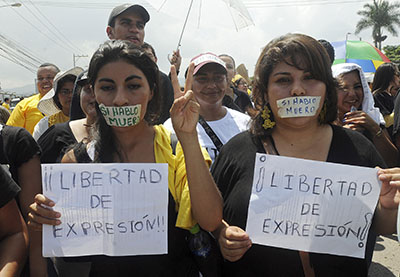
If journalists are particularly fearful in Honduras it’s because they are up against a threat they say is more insidious than even the state repressors of earlier eras. The surge of gangs transplanted from the U.S., organized crime, and the incursion of Mexican drug cartels has imperiled all of Honduran society. Rodrigo Wong Arévalo, owner of Canal 10 and host of a news program, spoke confidently of the comparatively healthy amount of freedom of expression that he says exists in Honduras, particularly in comparison with military rule in the 1970s. A prominent figure in the country, he was greeted by waiters and graciously posed for photos with other patrons of the upscale hotel restaurant where he met with CPJ earlier this year. But when he spoke of organized crime, he looked over his shoulder first before dropping his voice to a whisper. Journalists have to “submit to an individual system of self-regulation as part of the human instinct for survival,” he told CPJ. One has to “know the limits. Know how far you can go and try not to pass those limits because you know it could cost you dearly. Things have changed,” he added. Under military rule, “you knew who you were facing. Now, with organized crime, you don’t know who you are up against.”
Almost all of the journalists and editors interviewed by CPJ in May were frank about self-censorship when it came to organized crime and drug trafficking. Geovanny Domínguez, news editor of the daily El Tiempo, said that the newspaper decided not to investigate organized crime in depth about three years ago–around the time the offices of the daily La Tribuna were fired on by gunmen after the paper published reports linking police officers to murders. Domínguez said journalists covering organized crime and drug trafficking rely on official statements from the government or foreign embassies. Other precautionary measures include adding bylines to only the most innocuous culture or society reports.
The situation is more stark for journalists outside major cities and particularly in areas such as Olancho, where organized crime is so firmly in control that armed members openly drive through the streets, according to freelance radio and television journalist Rolando Iscoa. Every journalist in the area knows that reporting on these issues is forbidden and that anyone who breaks these rules “knows what awaits him,” Iscoa told CPJ. José Luis Maradiaga Paz, a correspondent for Globo radio and television in Olancho, says drug traffickers “have identified [journalists’] family members and know their movements. They have eyes and ears and informants in the police and prosecutor’s office who know what you are up to.”
The Salvadoran online newspaper El Faro is the only outlet in the region that does investigative reporting on organized crime in Central America. But according to El Faro Director José Luis Sanz, even its journalists are aware of how far they can go in Honduras. Although Guatemala is dangerous, Sanz says they have been able to construct a network of reliable and trustworthy sources that allows them to operate. In Honduras, he told CPJ, they lack any reliable source–in government and the local press corps–and even finding a trustworthy fixer is difficult. “We have no safe entrance” into the country, he told CPJ. In Guatemala, El Faro has carried out in-depth multi-year investigations. On reporting trips to Honduras, Sanz told CPJ, he gets in and out as quickly as possible.
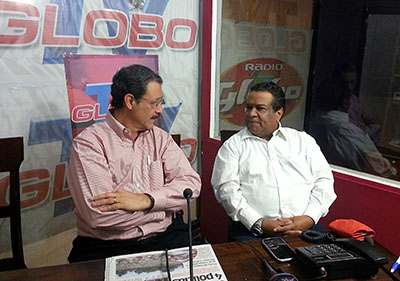
This lack of reporting has created an information void over some of the most critical challenges facing the nation. The kidnapping and murder in 2013 of Aníbal Barrow, the prominent host of a morning talk show on Globo TV called “Aníbal and Nothing More,” shocked the nation much like that of Villatoro a year earlier. If the manner in which Villatoro’s body was found was macabre and mysterious, Barrow’s was direct and gruesome: his dismembered body was found in a lagoon, his body parts, it was rumored, fed to crocodiles. These details appeared to indicate the influence, whether directly or by imitation, of the notoriously vicious Mexican drug cartel the Zetas, which has steadily taken control of swaths of Honduran territory in recent years. But the feared criminal group’s presence is not something discussed openly in connection to the crime or at all in the press. In May, the government extradited a drug trafficker for the first time to the U.S. In light of what happened in Colombia, where the threat of extradition unleashed a bloody war between Pablo Escobar’s Medellín cartel and the Colombian government in the 1980s, the decision to extradite was a landmark one, and Wong told CPJ that no one knew how the cartels would react. “No one wants to talk about it,” Mejía told CPJ. “The government isn’t prepared for the reaction and journalists even less so.”
Whatever happens next will have serious consequences for the public, from Honduras to the U.S., where the surge of migrants fleeing drug wars and economic stagnation have caused a major crisis on the U.S.-Mexican border. But the public’s ability to have reliable information about these developments will be seriously compromised because most local journalists are too terrified to report on them. And members of the press who look to journalists from the U.S. or Europe to get important stories out are likely to be disappointed. The last remaining permanently based foreign correspondent left the country earlier this year over security and other concerns. International correspondents show up from time to time, but getting cash-strapped foreign news outlets to focus on Honduras while conflicts rage in more geopolitically significant countries such as Syria, Iraq, and Ukraine is an uphill battle.
Thus, it is unsurprising that the motive for Barrow’s murder, though suspected hit men have been arrested and a trial is under way, remains shrouded in mystery and is the subject of persistent rumors. Self-censorship by the press, coupled with deficient investigations by authorities, has left most journalists’ murders in similar states of uncertainty. Was the journalist targeted for his work? Another victim of the country’s rampant crime crisis? Or was the reporter involved in corruption? In a press culture marked by low salaries–and often murky ethics, according to local reporters–this last concern is one frequently mentioned by Honduran journalists though usually left unpublished. From low-level business agreements with, or extortion of, local politicians to more dangerous financial entanglements with organized crime figures, the Honduran press “has high levels of corruption … and it is a long-term phenomenon,” according to Mejía. Álvarez and Berríos told CPJ they believed many of the journalist killings included elements of corruption on the part of the victim but, as Mejía noted, without competent investigations it is impossible to prove, and authorities can easily insinuate criminal activity and discard any link to journalism without having to present a burden of proof. Local and international human rights organizations are also hesitant to include these concerns without proof and choose to document cases differently, resulting in variations in statistics on murders and attacks.
In a country as dangerous as Honduras there are many things, aside from corruption, that can get a person killed. In the more than dozen cases where CPJ research was unable to find sufficient evidence to potentially link the crime to journalism, many of the victims were the hosts of musical programs, performed duties unrelated to newsgathering at the outlet, held other jobs, were involved in unrelated disputes, or appeared to have been the victim of common crime. CPJ does not include these cases in its statistics of journalists killed in reprisal for their work, but the onus is on the authorities regardless to bring those responsible to justice.
This uncertainty has created a climate of fear among journalists. Domínguez said that the number of attacks has decreased since the violent peak after the coup, but in the absence of any resolution to the crimes “the fear persists. If we don’t know if they killed my colleague because of his work … or if it was common crime … we think better to take precautions and not publish” sensitive information. “The damage has been done,” he said. As Mejía says, “self-censorship is coming to stay in Honduras.”
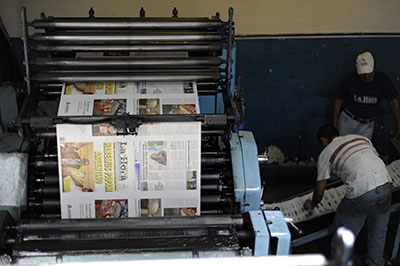
The Guatemalan press is keenly aware of the fate that has befallen many of its Honduran colleagues, and has taken heed. In 2011, after the press covered the massacre of farm workers by the Zetas in Petén province, alleged Zeta members hung banners in public places in four departments with anti-press messages such as: “Tone it down, before the war is with you.” While El Salvador-based El Faro may be able to do some reporting on organized crime in Guatemala, Marvin del Cid, a journalist with the magazine Contrapoder and a member of the editorial board of the online magazine Sala de Redacción, told CPJ that almost all Guatemalan coverage of drug trafficking relies on official sources. “Investigative reporting on organized crime is almost nonexistent,” he said. Haroldo Sánchez, head of news for television network Guatevisión, told CPJ that correspondents outside the capital “have no protection and are the most vulnerable.” He said the network sometimes sends reporters from the capital to cover sensitive stories in those areas to protect local correspondents but that, in general, coverage of anything beyond official announcements like the capture of a kingpin doesn’t happen because “that would mean death.”
In 2013, the killing of four journalists set off alarms in the country. As in Honduras, motives and links to journalism were difficult or impossible to establish in most cases. In only one, the abduction and murder of TV and radio journalist Carlos Alberto Orellana Chávez in the city of Mazatenango in southwestern department of Suchitepéquez, in August, did CPJ research determine that a work-related motive was possible, but not confirmed. Orellana hosted two news programs on the local cable station Canal Óptimo 23, where he had denounced corruption. Friends of the journalist told local reporters that in the days before his murder Orellana had broadcast critical reports about human trafficking, water contamination, local government corruption, and death threats that his granddaughter had received, according to news reports. Earlier that month in Mazatenango, gunmen shot and seriously injured radio and print journalist Fredy Rodas. A suspect was arrested in the Rodas case, but there have been no significant updates since. In February, another Mazatenango journalist, television news presenter Nery Morales, survived a shooting attempt on his life, according to news reports. Ángel Ramírez, a prosecutor in the justice department’s unit for crimes against the press, told CPJ, “We are continuing to work constantly on these cases and we continue to advance … [but since] we don’t know 100 percent [who committed the crimes] … we cannot pass on that information.” He would not comment publicly on whether the crimes were linked, or confirm possible motives. In the case of radio director Luis de Jesus Lima, who was murdered in 2013 in the eastern state of Zacapa, he said they were looking into criticism Lima had made of a local politician both on and off the air, but could not offer further details. Ramírez told CPJ that the unit was limited by the lack of cooperation by residents, who out of fear “won’t say anything.” He said his unit has a strong “commitment to solve these crimes” but many “external factors” complicated its work.
While organized crime may represent the most sinister threat, journalists in both countries say covering any sensitive issue is risky. Dina Meza, a Honduran human rights activist who has reported on issues such as the land conflict in the Bajo Aguán region for the local website Defensores en línea and is the Honduras correspondent for the international press freedom group Reporters without Borders, has denounced receiving anonymous threats and being followed on the street for years, but said authorities ignored her requests for security and an investigation. The minister of security, Arturo Corrales, told CPJ he did not discount that Meza had been threatened, but said the ministry had never received the complaints and, without them, could not investigate. Lourdes Ramírez, director of news at television station KTV in San Pedro Sula, told CPJ she fled Honduras in July after receiving messages she interpreted as threats related to the station’s reporting on corruption and mismanagement at a local hospital. Several journalists in Guatemala have reported being attacked and threatened by police, private security forces, and local workers while trying to cover protests of mining and hydroelectric projects, according to local press freedom group Cerigua. Not even international journalists have been spared. Prominent American documentary filmmaker Pamela Yates told CPJ she has received threats from right-wing groups in connection with documentaries she made about the civil war.
Responding to pressure by local and international civil society, the governments of both countries acknowledged the dangers facing journalists and, in 2012, publicly endorsed creating protection mechanisms modeled after Colombia’s successful program. For more than a year, both programs faltered.
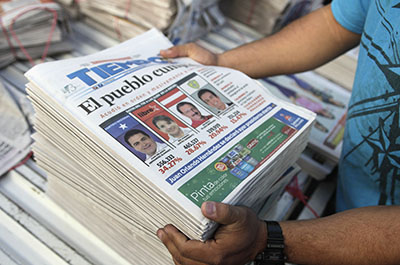
Two weeks after pledging support for the program in a meeting with CPJ in late May, however, the administration of Honduran President Juan Orlando Hernández, who took office in January, resurrected the plan that had been abandoned by his predecessor, and submitted a bill to congress. The law would create a special council tasked with enforcing the “recognition, respect and promotion” of the protection of human rights defenders, journalists, and justice system workers, and a mechanism to provide protection for those at risk. In June and July, the bill was approved in the first and second stages of debate. The government is refining the bill and consulting with civil society groups who have raised some concerns about oversight, procedural steps, and proper financing. A consensus needs to be reached before the third and final debate when the bill could become law, but Paolo Antonello Tavarone Pon, a lawyer in the office of the Deputy Human Rights and Justice Secretary, told CPJ no date has been set.
Hilda Hernández, strategy and communications minister and sister of the president, told CPJ that the country’s priority was fighting organized crime and lowering violence, but that the president was attentive to “anything that supports the ability of an individual to exercise his profession.” When asked if she would support the inclusion of Honduras as a pilot country for a U.N. plan that would strengthen international efforts to combat journalist murders and impunity, Hernández said yes, in theory, although she feared it might “stigmatize Honduras in this moment in which we are trying to do things differently.”
When it comes to accepting outside help on impunity and corruption issues from the U.S., which provides significant aid money with the caveat that human rights are upheld by security forces, Honduras has not been as reticent. The U.S. has assisted with investigations into the murders of journalists and LGBT figures–another at-risk group–as part of a joint violent crimes task force.
The proposed Guatemalan protection mechanism, intended to address concerns raised in the country’s 2012 United Nations Universal Periodic Review and pushed by Cerigua, has scarcely progressed. In July, Ana Margarita Castillo Chacón was selected as director of the initiative months after the allotted period to designate someone had expired. At the time of her appointment, she was given six months to present a plan for the program, though it remains to be seen if that deadline will be met. “There is the will” from the government to create the program, according to Cerigua director Ileana Alamilla. But, she told CPJ, there is also “enormous incompetence. Distraction. Mediocrity. They don’t know what to do nor how to do it. They won’t let themselves be advised.” At the same time an official committee, established in 2009 and made up of government representatives and civil society members including Cerigua, meets every Tuesday to “study patterns” in attacks on vulnerable groups including journalists and human rights defenders, and share information about cases.
Many Guatemalan journalists are dubious that the mechanism will be successful, citing the mostly ineffectual and under-resourced Justice Department’s unit for crimes against the press. It has a staff of five and frequently can’t investigate cases because the sole car assigned to the unit was stolen last year, according to Ángel Ramírez. The office has achieved two convictions since it was founded in 2001, but none in a murder case. Ramírez acknowledged the restraints of being understaffed but said the department worked hard despite its limited resources. He told CPJ the increasing number of complaints filed by journalists showed confidence in its work. Of the 110 cases the unit has received since 2009, 38 were made in the first half of 2014, according to Ramírez.
Many journalists however, expressed doubts to CPJ that a reporter would feel comfortable accepting protection from the government, especially as stewardship of the program has been taken over by the powerful communications secretary Francisco Cuevas. Guatevisión journalist Ben Kei Chin told CPJ that perhaps threatened journalists would take protection from the justice department, “but I wouldn’t trust any commission that comes from the president’s office.”
Marlon Garcia, an official in the human rights office of the executive branch, acknowledged that implementing the mechanism has been slow but added, “ever since he signed the decree, the president has been fulfilling his commitment to create the political will so that it functions.” In an email to CPJ, Secretary Cuevas said the government had made “significant advances,” such as the establishment of a commission to analyze the design of the mechanism and naming of a director. He added: “The questioning [of the government’s progress] has been only from a small group that disagrees with all of the state’s actions, but whom nonetheless we have repeatedly invited to participate.” He noted that Guatemala was only the third country in the world–after Colombia and Mexico–to adopt such a program, and that it took years for those countries to create and implement them.
Chin’s concern, however, was echoed throughout newsrooms in Tegucigalpa and Guatemala City in interviews with CPJ. While journalists in the capitals acknowledged the possible utility of a protection mechanism for at-risk journalists in the provinces, they were inherently suspicious of the motives of governments they see as increasingly intolerant to criticism and controlling in terms of access. Many journalists told CPJ that with the threat of organized crime, they feel both countries are experiencing “re-militarization” processes that are reversing advances made since the violent periods of military rule in the 1970s and 1980s.
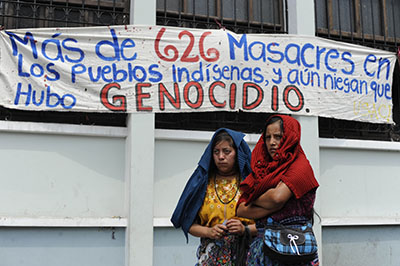
In Guatemala, the election of former general Otto Pérez Molina as president, and the trial of General José Efraín Ríos Montt on charges of genocide during the civil war, have split the country along lines many hoped they had overcome. “Before, you were a critic,” Chin told CPJ. “Now you are a terrorist, enemy of the state, communist, guerrilla. The old tags have come back.”
But the repressive measures of the 21st century are far more sophisticated than those used by the 20th-century predecessors, according to many local journalists. In Honduras, many expressed concern about recently passed laws providing broader authorization to monitor communications and classify information in the name of fighting drug trafficking. The so-called “secrets law”–which allows the executive branch to make any information that pertains to security, including budgets, classified–was passed in a particularly non-transparent fashion and despite the protests of the government-appointed director of the office that oversees the implementation of the country’s access to information law. Migdonia Ayestas, who directs a program at the National Autonomous University of Honduras that monitors statistics on violence, told local press freedom group C-Libre that the Ministry of the Interior had stopped sharing its data with her. Corrales told CPJ that the ministry does share security-related information, including statistics, with the public on a daily basis on its website. These legal mechanisms may be subtle, but they have a “big impact on freedom of expression,” Mejía told CPJ.
In both press corps, there is a widespread feeling that President Hernández and President Pérez Molina are particularly intolerant of critical voices. Honduran journalist Marvin Ortiz of Radio Globo, which along with the affiliated station Globo TV was targeted several times after the 2009 coup, told CPJ that reporters from media outlets that supported Zelaya and oppose the current government still feel stigmatized and persecuted, and that Hernández denigrates them publicly in the press. Jorge Burgos told C-Libre that his news program “Suelte la Lengua” [Speak Freely] on television network Canal 6 was canceled by the station’s management out of fear of losing government advertisement revenue after he repeatedly criticized the president. C-Libre said sources at the network said the show was canceled because Burgos refused to host it when technical problems impeded the ability of viewers to call in directly on several days. Burgos told C-Libre the technical issues were an excuse to cancel the show. In another case, Albertina Manueles Pérez, of Radio Progreso, was charged with sedition alongside many indigenous group members after she reported on the group’s clashes with local authorities. The case was later provisionally dismissed, which means it could be reopened if new evidence is introduced, according to Radio Progreso.
Hilda Hernández denied to CPJ that the opposition-affiliated outlets were being stigmatized or refused access, and accused them of “distorting” information. Mejía told CPJ she didn’t think the current government was directly repressing or persecuting the outlets, but that they had settled on a strategy designed to minimize them by “ignoring them” and “asphyxiating them with [a lack of] advertising.” That analysis wasn’t far from Hilda Hernández’s own assessment, when she told CPJ: “The truth is I don’t listen to them … [and] since the election very few people” do.
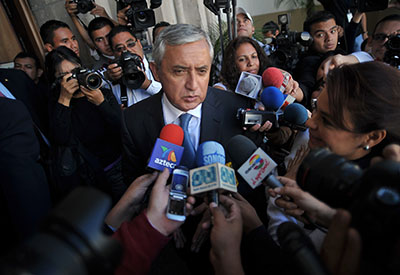
Secretary Cuevas praised moves by the Guatemalan government that, in his opinion, expand press freedom, such as inviting reporters on official state trips. Enrique Naveda, of the Guatemalan online investigative journalism outlet Plaza Pública, and Pavel Gerardo Vega of the critical Guatemalan daily elPeriódico however, complained that the Pérez Molina government had shut them out of coverage by refusing interviews, never including them in the distribution list for the official agenda or letting them know about official trips (perks reserved for “friendly” outlets). They both described anecdotes in which journalists at press conferences were allegedly used to plant softball questions for the president, who has been accused of calling newsrooms to complain about critical journalists and endanger their jobs. A recent study by Plaza Pública showed that 46 percent of government institutions have not complied with a regulation requiring them to submit annual reports on their responses to public information requests.
The distribution of state advertising is widely used to reward favorable coverage and punish critics, according to journalists in both countries. In the civil war years, those in power “killed journalists,” Sánchez told CPJ. “Now they just touch the advertising budget.” The practice is not new, and is widespread across the region.
But it’s not just government advertising that is at stake. ElPeriódico, which is involved in a long-running conflict with the government, never got much of that anyway. The newspaper alleges that the government has used its sway with the country’s biggest companies to engage in a commercial advertising boycott of the daily as well. Secretary Cuevas did not answer questions about pressure on private advertisers but, in an email to CPJ, he denied that the government had withdrawn all state advertising from elPeriódico. Juan Luis Font, editor of the Guatemalan magazine Contrapoder, however, said that the government has continued the practice of using its influence over advertisers to reward and punish news outlets. He told CPJ he believes the most dangerous issue for an outlet’s livelihood is to report on ties between the government and big businesses, and how they benefit one another.
But Font says the move by Guatemalan officials and politicians to prosecute critical journalists with criminal offenses has damaged press freedom the most. Contrapoder faced potentially bankrupting fines from a criminal complaint brought against it for publishing a faulty article regarding an opposition politician [the magazine immediately issued a correction]. The case was later dismissed but the politician and the outlet continued to have a tense relationship, according to news reports.
The most serious legal case has been against elPeriódico, whose owner, José Rubén Zamora Marroquín, is engaged in a dispute with the president, and vice-president Roxana Baldetti Elías. Since early 2013, the daily has published a series of articles, including many opinion columns by Zamora that have alleged corruption or ties to organized crime within the government. Zamora was briefly barred from leaving the country in January in relation to a criminal complaint brought by the president in November, which accused the editor of coercion, blackmail, extortion, violating the constitution, and insulting the president. In a separate case in December, the vice-president filed a complaint against Zamora using the country’s law against gender violence and crimes against women.
In 2013, the daily was repeatedly targeted with threats, intimidation, physical attacks, and cyber attacks, according to CPJ research. The origin of most of the attacks is unknown, but most occurred shortly before or after the outlet had published articles alleging corruption or ties to organized crime within the government. Zamora, a 1995 International Press Freedom Awardee, has been the target of violent attacks twice under previous administrations.
After widespread criticism, Pérez Molina withdrew his complaint but Baldetti’s remains in place, according to elPeriódico’s director, Rodolfo Móvil. In July, director of the Guatemalan Social Security Institute Juan de Dios Rodríguez filed more than 30 criminal complaints against Zamora and elPeriódico’s top editors for defamation, inciting violence and sedition among other offenses. In the latest incident, on September 15, the government posted on its website the content of an elPeriódico story that was meant to be published the following day, which accused Baldetti of corruption and showed pictures of one of her estates. The government refuted the claims of the article, and said it had received the as-yet-unpublished text in an anonymous letter. ElPeriódico said that it was evidence that the government was spying on the newspaper.
ElPeriódico News Editor Julia Corado said there has been uncertainty and fear in the newsroom about the future of the paper. Móvil and Corado told CPJ they are convinced the government is planning to fabricate some kind of unrelated criminal abuse case against Zamora and that “whatever it takes, they are going to get him in jail.” Secretary Cuevas emphatically denied the allegation in an email to CPJ, and accused elPeriódico of “blackmail and extortion.”
Zamora’s style of journalism–and his unrelenting and, some say, unsubstantiated allegations–have been criticized in the media. The only thing every journalist seemed to agree on was that the Guatemalan press corps, from the most senior level to the bottom, is divided. The press might learn the dangers of this divide from the experiences of colleagues in Honduras. The split in the media, cemented with the 2009 coup, has left journalists more isolated and at risk in a country with even more anarchic violence and tenuous rule of law than Guatemala.
There are instances in the region–such as Colombia and Brazil–of journalists overcoming rifts to unite in the face of a deadly and shared threat. The best hope for the Guatemalan and Honduran media–where every journalist told CPJ the press lacks the skills and training to face the dangers on their own–is to follow those examples. “We had won so much space for criticism” in the decades since the civil wars in Central America, Chin told CPJ. “Every day that space is getting smaller.”
Sara Rafsky is research associate in CPJ’s Americas program. She wrote CPJ’s 2012 special report on press freedom in Argentina, contributed to the 2014 special report on Brazil, and provided research for the 2013 special report on the Obama administration and the press. Previously a freelance journalist in South America and Southeast Asia, she was awarded a 2008 Fulbright Grant to research photojournalism and the Colombian armed conflict.
CPJ’s recommendations
To the Honduran and Guatemalan governments:
- Condemn all acts of violence against journalists.
- Conduct exhaustive and timely investigations and trials for crimes against journalists. Ensure all investigations extend to the crime’s masterminds, not merely the gunmen. Make adequate resources, political support, and security available for those investigations. In the case of Guatemala, increase the budget for the Justice Department’s unit for crimes against the press. In the case of Honduras, increase resources for the Violent Crimes Task Force.
- Create a protection mechanism that provides security for journalists under threat. Ensure that civil society and local journalists have active participation in the development of this mechanism. In the case of Honduras, support the proposed bill in Congress. In the case of Guatemala, prioritize and implement the existing proposal that has been approved by the government.
- Decriminalize defamation. Pass legislation to ensure libel is treated only as a civil offense.
- Refrain from filing criminal complaints under serious charges, such as sedition and gender-based violence, against critical journalists and media.
- Publicly commit to providing equal access to official events. Distribute government advertising to all outlets, regardless of their political or ideological affiliation. Refrain from putting economic or editorial pressure on critical outlets.
- Guarantee full implementation of any precautionary measures for journalists authorized by the Inter-American Commission on Human Rights.
- Publicly recognize the International Day to End Impunity on November 2.
- Respond with detailed information on the judicial status of all cases of killed journalists and steps taken to address impunity as requested by UNESCO’s director-general for the bi-annual report on The Safety of Journalists and the Danger of Impunity. Make your full responses available to the public.